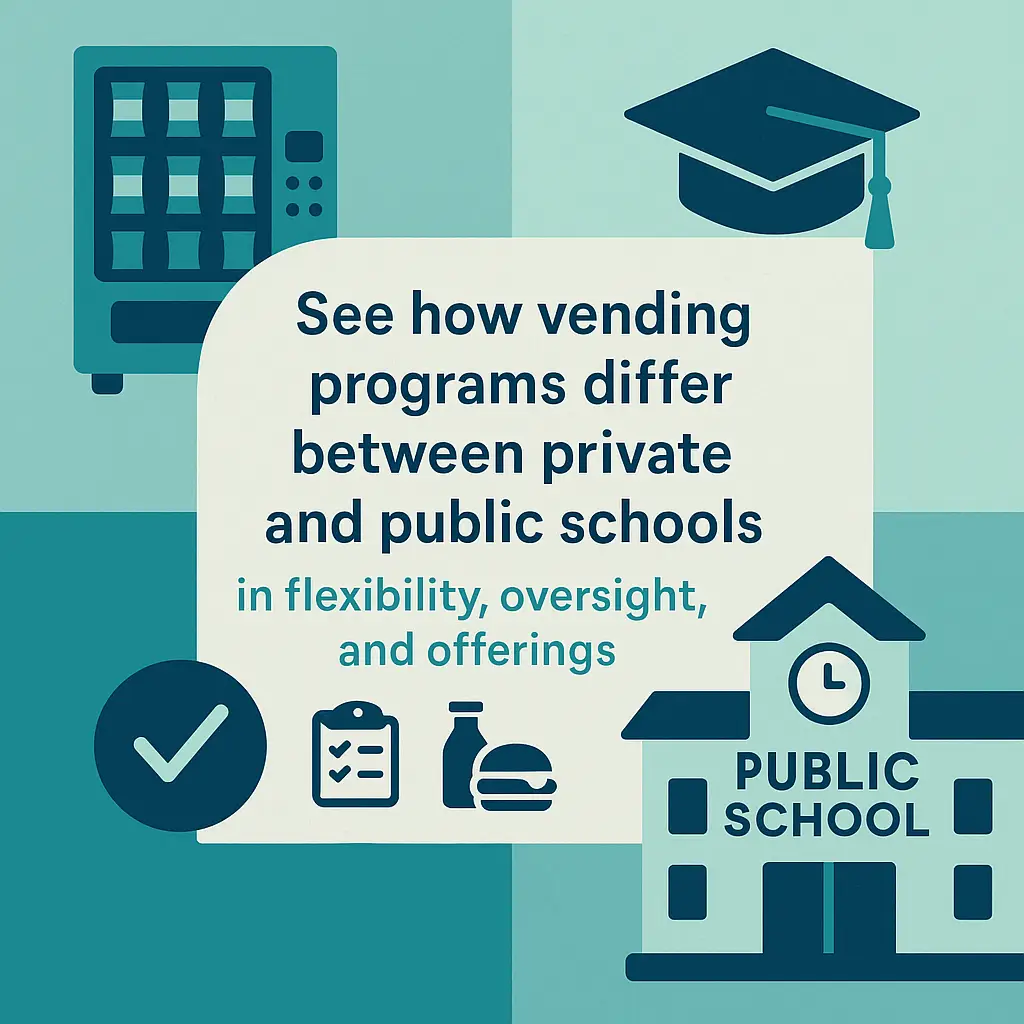Vending in Private vs Public Schools
See how vending programs differ between private and public schools in flexibility, oversight, and offerings.
Back to Vending for Schools ResourcesSee how vending programs differ between private and public schools in flexibility, oversight, and offerings.
Back to Vending for Schools ResourcesPublic schools often follow strict federal nutrition standards, limiting available products. Private schools typically set their own policies, allowing more flexibility in product and vendor selection based on student preferences and administrative goals.
![]() Public schools follow stricter nutritional guidelines and policies
Public schools follow stricter nutritional guidelines and policies
![]() Private schools have more flexibility in snack and drink offerings
Private schools have more flexibility in snack and drink offerings
![]() Both benefit from contactless and smart vending technology
Both benefit from contactless and smart vending technology

Though both public and private schools benefit from vending programs, each operates under different policy frameworks and expectations. Understanding the key differences between the two settings is essential for administrators implementing or upgrading vending services.
Public schools usually need to comply with USDA Smart Snacks in School standards, especially when participating in federal lunch programs. These nutritional guidelines restrict items high in sugar, sodium, and fat, and often dictate vending machine hours of operation. Vending vendors serving public schools must be equipped to provide compliant offerings, such as low-sugar beverages, whole-grain snacks, and portion-controlled items.
Private schools have more latitude in deciding both the type of products and the provider. This flexibility allows them to tailor vending programs to student preferences while balancing health-conscious goals. Some private schools even opt for high-tech vending options like AI coolers and micro markets to bring variety and modern convenience to campus.
In terms of oversight, public schools typically require vendor contracts to be approved by school boards or district buyers. Private institutions may streamline the process with internal approvals, making for faster implementation times and adaptive service changes. Both types, however, value reliability, prompt restocking, and machine functionality.
Technological improvements have made vending services smarter across both sectors. Whether it’s a public high school seeking healthier drinks or a private academy wanting premium snacks with contactless payment, vending solutions are evolving to meet modern student and school needs.
To learn more about vendor considerations, see our guide comparing local and national vending providers. If you're overseeing facilities, also explore this resource on vending solutions for large campuses.
If you're exploring vending options for your business, Vending Exchange can help simplify the process. Delivery, Installation and Equipment is provided at no cost to you - vendors provide the machines, keep them stocked, and handle all servicing. Whether you need a provider or full-service management, just fill out the form on this page to get started.
Yes. Public schools must comply with USDA Smart Snacks guidelines, which limit sugar, sodium, and fat content in items.
Private schools set their own policies and can include products like candy and soda if aligned with their wellness policies.
Combo machines with USDA-compliant snacks and drinks or healthy vending setups are ideal for public schools.
Yes, public schools often require school board or district-level approval, extending the onboarding process.
Yes, private institutions often have fewer administrative hurdles and can approve vending services more quickly.
Experienced vendors source Smart Snack-compliant products and help schools meet state and federal regulations.
They can be used if stocked with compliant items and meet district and safety requirements.
Many do, especially those looking to offer variety, contactless payments, and a premium student experience.
Common issues include broken machines, expired products, poor restocking service, and limited product selection.
Partnering with reliable vendors who offer managed service agreements ensures machines are stocked, serviced, and aligned with school policies.